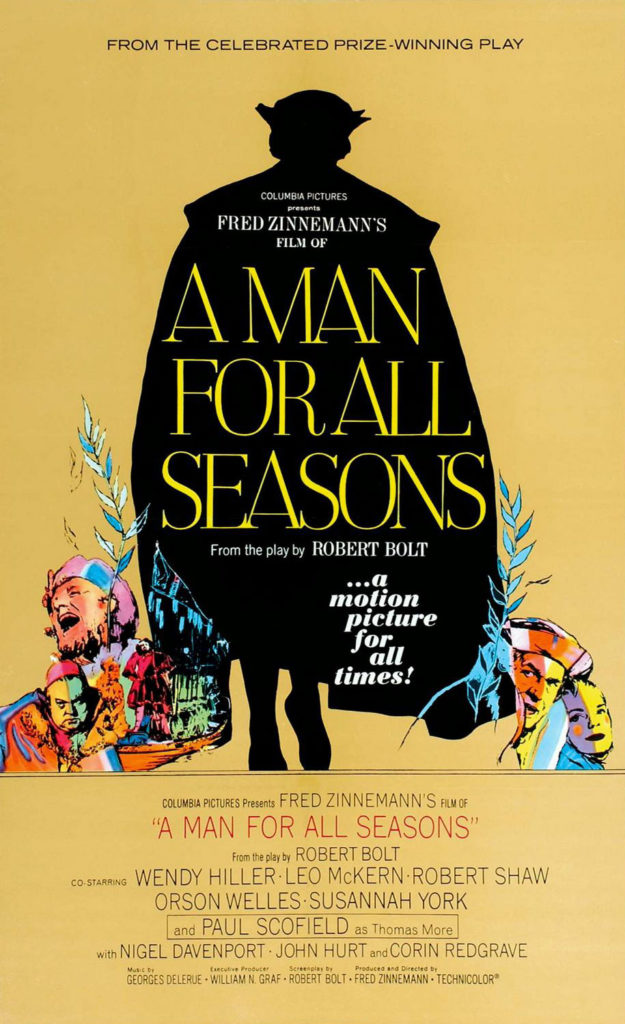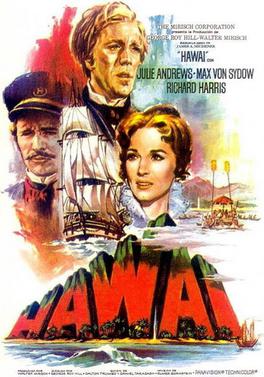1966
Okay, we’ve sung, we’ve danced, we’ve visited classic stories that people know even if they’ve never seen the movie or stage versions. We’ve had three familiar faces in a row.
Hope you enjoyed that, because 1966 went a different way.
And The Oscar Goes To…
A Man For All Seasons is not a story that could be inferred from its somewhat generic title. It’s based on a play about Sir Thomas More, his rise to Lord High Chancellor of England under Henry VIII, and how he soon after lost that title, then got accused of and eventually executed for treason because he wouldn’t publicly endorse King Henry’s divorce from Catherine of Aragon and marriage to Anne Boleyn.
There are some solid themes in here. More goes on some well-delivered tirades about the necessity of law to be upheld and to be universal. Tirades that do kind of explain how Paul Scofield won an Oscar for this movie. He argues that his convictions cannot shift with political currents, and that trials must adhere to law and not political favour.
So if you dig into it, there’s a cautionary tale about the necessity of rule of law, and the dangers of abandoning it for political agenda, and god damn do some prominent politicians need that message. It would especially work if they spent more than a voice-over epilogue on the fact that of More’s three main accusers, Cromwell, Norfolk, and the newest Cardinal, Cromwell was beheaded five years after More, the Cardinal was burned at the stake, and the Duke of Norfolk only escaped execution because Henry died of syphilis, and Tudor-era England was used to overlooking some mild treason against the old king once the new one is sworn in.
Or if you dig in from another angle, it could be an exploration about how centrism doesn’t work. More refuses to endorse Henry’s remarriage, but he assumes that since he never denounces it, publicly or privately, he is irrelevant and safe from accusation, and he is not. Inaction accomplishes little, it neither saved More nor served his principles.
There even could have been an angle to how John Hurt’s Richard Rick goes where the political winds are blowing, to the point of testifying against his old friend More to secure a prominent position, and the end-narration explains that unlike most of the cast, he died wealthy, powerful, and in his own bed.
But the problem is that everyone’s argument is on such shaky ground. Thomas More refusing to get on board with Henry’s divorce because of his rigid Catholicism has aged like milk next to a radiator, especially given how Henry chose to get rid of some other wives. On that note, More being tried for treason because he wasn’t on board with Henry marrying Boleyn doesn’t look great given how Henry had her beheaded ten months after More.
And More’s inaction, his refusal to confirm or deny his accusations in the hope that the letter of the law will shield him, is definitely portrayed as a virtue rather than the fatal flaw that undoes him. So there are some potentially good themes and messages here, but you really need to dig for them, to the point I can’t be sure the filmmakers (or playwright) knew they were there.
Which… I don’t love.
Anyway here’s a Twitter thread because I’m doing that again.
And Rotten Tomatoes Says: It’s all the way down at #73, in “Yeah, this one might have been a mistake” territory.
What’s Good, Hays Code? All the main characters are way too rigidly Catholic to violate the Hays Code.
The box office champ, however…
The Box Office Champ
Man but audiences could not get enough of Julie Andrews in the 60s. Fair, I get it, no complaints.
A would-be missionary (Max von Sydow) wants to take a posting in Hawaii alongside a doctor in the church (Gene Hackman), but first has to get married because his church doesn’t send single men on missions. So he gets married to a woman he just met (Julie Andrews) so that her parents don’t have to watch her mope about her sailor boyfriend. So The Force Awakens’ Lor San Tekka, Superman’s Lex Luthor, and the voice of the giant sea monster from Aquaman all ship out to Hawaii, where they’re horrified by the natives’ hedonistic ways and sibling marriage among royalty (careful about throwing stones there, Europeans, Hackman’s character married his cousin), but also keep bungling everything by insisting that as White Christians they know best. For instance, von Sydow ignores all native advice over how to build his church so that it can withstand strong winds, and wouldn’tcha know it, its gets blown down by strong winds. Everyone suffers, people die, Julie Andrews’ sailor ex who had been writing to her but his letters were hidden by her parents feeds von Sydow to a shark that munches his leg a bit…
And it’s trash. It’s colonizer trash. I absolutely understand why this star-studded hit movie has been so forgotten by film history I’d literally never heard of it before I started this project. It might be more racist than Gone With the Wind and it might make Christianity look worse than Quo Vadis, it’s trash. I’m not saying a bunch of 60s dudes watched this thing to see some Polynesian boobies on the big screen, but… well, it’s an answer.
Also, in fairness, it was the top grosser of 1966 but it turns out that’s not saying much. It only made $15.6 million, which even for 1966 wasn’t a lot. It’s about half what Mary Poppins and My Fair Lady brought in. Barely more than a fifth what Sound of Music did a year earlier. Cleopatra outgrossed Hawaii by over 10 million and it nearly bankrupted its studio. I don’t know what exactly it was about 1966 that made people stay home, maybe TV was good, maybe they noticed that 1966 releases were kind of trash in general, but based on typical numbers if there’d been a Bond movie this year I could’ve covered it instead.
But on the plus side, Hawaii very barely beat The Bible: In the Beginning at the box office, so at least I was spared another bible epic.
And Rotten Tomatoes Says: Of the nine reviews, six count as positive. The audience score is less forgiving but still too high.
What’s Good, Hays Code? Wow there were a lot of exposed breasts in this movie. Maybe not compared to a direct-to-video American Pie sequel but for Code-era Hollywood, lots. The Hays Code was on its last legs, to be sure. Unless the Code took the perspective of “Eh, as long as they’re not white women’s breasts, it’s fine,” in which case WOW. I would really rather assume the Code was just losing its grip, even though I know there’s racism baked into it.
Other Events in Film
When the Best Picture and box office champ are this obscure, the Other Events can either be a murderers’ row of cult classics, or proof that 1966 was just that hard up for quality content. Mostly column B, if I’m being honest.
- Sergio Leone gave Clint Eastwood’s Man With No Name a magnum opus in The Good, the Bad, and the Ugly.
- A Man For All Season’s main award competitor was Who’s Afraid of Virginia Woolf, which landed acting trophies not only for Elizabeth Taylor, but Sandy Dennis as Honey. It’s not easy to win an acting award playing Honey, it is a staggeringly thankless role.
- Peter Cushing returned to the Tardis for Daleks – Invasion Earth: 2150 A.D. (yeah, I ran out of legit classics pretty fast), based on “The Dalek Invasion of Earth,” a serial famous for being the first time Doctor Who wrote out a companion. What’s weird about this one is that I’ve seen the trailer, and it doesn’t even mention the Doctor. Sure they mention Peter Cushing, but not who he’s playing. The trailer plays it just as an alien invasion movie with Daleks in it. But it does feature Bernard Cribbins, who fortyish years later would be the final companion of David Tennant, the utterly delightful Wilfred Mott.
- Adam West and Burt Ward threw on some tights and utility belts to battle evil in Batman: The Movie, everything the Snyder Cult are afraid of in a Batman project, and maybe exactly what we’ll need when Matt Reeves is done with his version. Honestly given the enduring popularity of the TV show, I’m a little surprised this didn’t crack the top ten at the box office.
- There were still musicals happening, as ’66 saw a film version of A Funny Thing Happened on the Way to the Forum, but it made less of a splash than the last three we discussed.
- The Empire of Joy lost its founder, as Walt Disney passed at the end of the year. He had three more movies in the works that he’d been supervising, but Disney hit a bit of a rough patch in the years to come.
So 1966 was a bad year. Bad, bad year. Thankfully 1967 looks better, and back into “How I have I not seen this yet” territory.
Next Page: Mr. Tibbs, you’re trying to seduce me.


